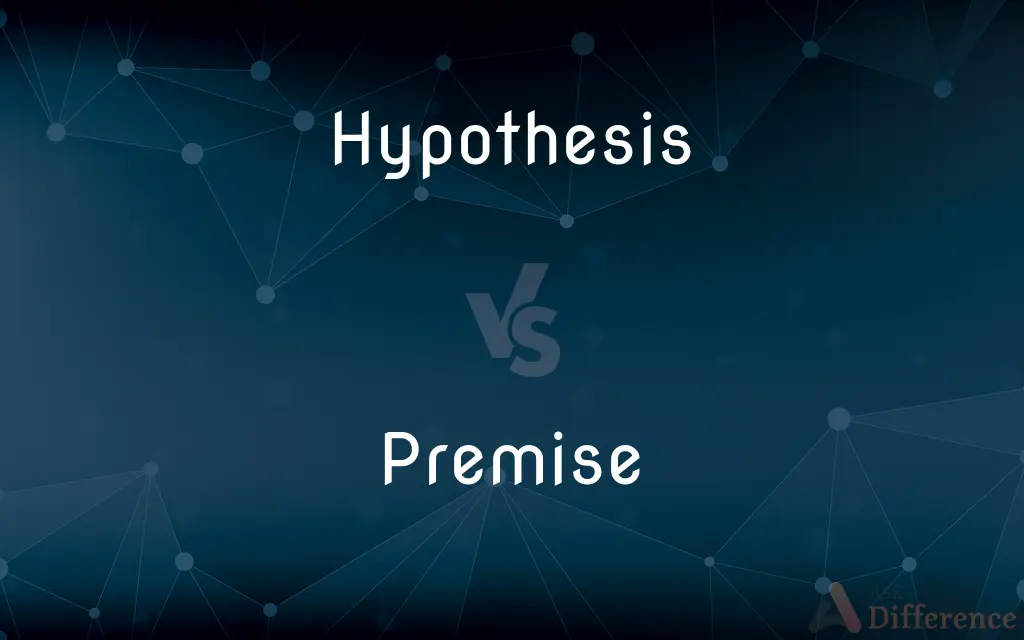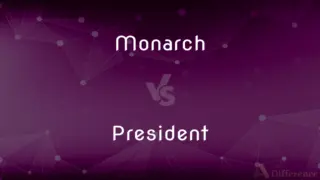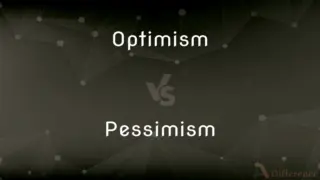Hypothesis vs. Premise — What's the Difference?
By Tayyaba Rehman — Published on September 17, 2023
A hypothesis is a testable prediction often used in experiments, while a premise is a foundational statement assumed true for the sake of an argument.

Difference Between Hypothesis and Premise
Table of Contents
ADVERTISEMENT
Key Differences
A hypothesis is typically found in scientific experiments and research. It's a proposed explanation for an occurrence, based on limited evidence, which can then be investigated. A premise, on the other hand, is an assumption or proposition from which conclusions can be drawn.
While both hypothesis and premise lay the groundwork for further exploration, their context of use is distinctly different. A hypothesis is something you might set out to prove or disprove through experimentation. Premise is used as a foundational stone in logical arguments and philosophical debates.
When constructing a hypothesis, a scientist is laying out an educated guess to explain an observation, ready to test its validity. In contrast, when using a premise, one is beginning with a foundational assumption to form conclusions in logic or argumentation.
Another way to differentiate is through their testability. A hypothesis is inherently testable; it's designed to be. A premise isn't necessarily something to be tested in an experiment, but rather questioned, analyzed, and debated upon.
Both hypothesis and premise serve as starting points in their respective fields: the former for scientific investigation and the latter for logical reasoning or argumentation.
ADVERTISEMENT
Comparison Chart
Nature
Testable prediction
Foundational statement
Usage
Scientific experiments
Logical arguments and debates
Testability
Designed to be tested
Not necessarily tested but debated upon
Basis
Formed based on limited evidence to explain an observation
An assumption or proposition
Outcome
Leads to experiments and results
Leads to conclusions based on logic or argumentation
Compare with Definitions
Hypothesis
A foundational idea to be explored and validated through scientific method.
His hypothesis regarding the chemical reaction was proven false after the experiment.
Premise
A base assumption from which logical conclusions are drawn.
The entire novel revolved around the premise that time travel was possible.
Hypothesis
A tentative explanation for an observation or phenomenon that can be tested.
Her hypothesis was that plants grow faster under blue light.
Premise
The initial point in a line of reasoning.
Her speech began with a simple premise: that everyone deserves respect.
Hypothesis
A supposition made on the basis of limited evidence.
His hypothesis about the event was purely speculative without concrete evidence.
Premise
A premise or premiss is a statement that an argument claims will induce or justify a conclusion. It is an assumption that something is true.
Hypothesis
An educated guess that provides a basis for further experimentation.
Based on her observations, her hypothesis was that warmer temperatures increased reaction speed.
Premise
A proposition upon which an argument is based or from which a conclusion is drawn.
Hypothesis
A proposed solution to a problem which needs experimental validation.
The research team's hypothesis about the disease's spread was groundbreaking.
Premise
One of the propositions in a deductive argument.
Hypothesis
A hypothesis (plural hypotheses) is a proposed explanation for a phenomenon. For a hypothesis to be a scientific hypothesis, the scientific method requires that one can test it.
Premise
Either the major or the minor proposition of a syllogism, from which the conclusion is drawn.
Hypothesis
A tentative explanation for an observation, phenomenon, or scientific problem that can be tested by further investigation.
Premise
Land, the buildings on it, or both the land and the buildings on it.
Hypothesis
Something taken to be true for the purpose of argument or investigation; an assumption.
Premise
A building or particular portion of a building.
Hypothesis
The antecedent of a conditional statement.
Premise
(Law) The part of a deed that states the details of the conveyance of the property.
Hypothesis
(sciences) Used loosely, a tentative conjecture explaining an observation, phenomenon or scientific problem that can be tested by further observation, investigation and/or experimentation. As a scientific term of art, see the attached quotation. Compare to theory, and quotation given there.
Premise
To provide a basis for; base
"The American Revolution had been premised on a tacit bargain that regional conflicts would be subordinated to the need for unity among the states" (Ron Chernow).
Hypothesis
(general) An assumption taken to be true for the purpose of argument or investigation.
Premise
To state or assume as a proposition in an argument.
Hypothesis
(grammar) The antecedent of a conditional statement.
Premise
To state in advance as an introduction or explanation.
Hypothesis
A supposition; a proposition or principle which is supposed or taken for granted, in order to draw a conclusion or inference for proof of the point in question; something not proved, but assumed for the purpose of argument, or to account for a fact or an occurrence; as, the hypothesis that head winds detain an overdue steamer.
An hypothesis being a mere supposition, there are no other limits to hypotheses than those of the human imagination.
Premise
A proposition antecedently supposed or proved; something previously stated or assumed as the basis of further argument; a condition; a supposition.
Hypothesis
A tentative theory or supposition provisionally adopted to explain certain facts, and to guide in the investigation of others; hence, frequently called a working hypothesis.
Premise
(logic) Any of the first propositions of a syllogism, from which the conclusion is deduced.
Hypothesis
A proposal intended to explain certain facts or observations
Premise
Matters previously stated or set forth; especially, that part in the beginning of a deed, the office of which is to express the grantor and grantee, and the land or thing granted or conveyed, and all that precedes the habendum; the thing demised or granted.
Hypothesis
A tentative theory about the natural world; a concept that is not yet verified but that if true would explain certain facts or phenomena;
A scientific hypothesis that survives experimental testing becomes a scientific theory
He proposed a fresh theory of alkalis that later was accepted in chemical practices
Premise
A piece of real estate; a building and its adjuncts.
Trespass on another’s premises
Hypothesis
A message expressing an opinion based on incomplete evidence
Premise
(authorship) The fundamental concept that drives the plot of a film or other story.
Premise
To state or assume something as a proposition to an argument.
Premise
To make a premise.
Premise
To set forth beforehand, or as introductory to the main subject; to offer previously, as something to explain or aid in understanding what follows.
Premise
To send before the time, or beforehand; hence, to cause to be before something else; to employ previously.
Premise
A proposition antecedently supposed or proved; something previously stated or assumed as the basis of further argument; a condition; a supposition.
The premises observed,Thy will by my performance shall be served.
Premise
Either of the first two propositions of a syllogism, from which the conclusion is drawn.
While the premises stand firm, it is impossible to shake the conclusion.
Premise
Matters previously stated or set forth; esp., that part in the beginning of a deed, the office of which is to express the grantor and grantee, and the land or thing granted or conveyed, and all that precedes the habendum; the thing demised or granted.
Premise
A piece of real estate; a building and its adjuncts; as, to lease premises; to trespass on another's premises.
Premise
To send before the time, or beforehand; hence, to cause to be before something else; to employ previously.
The premised flames of the last day.
If venesection and a cathartic be premised.
Premise
To set forth beforehand, or as introductory to the main subject; to offer previously, as something to explain or aid in understanding what follows; especially, to lay down premises or first propositions, on which rest the subsequent reasonings.
I premise these particulars that the reader may know that I enter upon it as a very ungrateful task.
Premise
To make a premise; to set forth something as a premise.
Premise
A statement that is assumed to be true and from which a conclusion can be drawn;
On the assumption that he has been injured we can infer that he will not to play
Premise
Set forth beforehand, often as an explanation;
He premised these remarks so that his readers might understand
Premise
Furnish with a preface or introduction;
She always precedes her lectures with a joke
He prefaced his lecture with a critical remark about the institution
Premise
Take something as preexisting and given
Premise
A foundational statement or proposition that forms the basis for a work or theory.
The premise of his argument was that all humans are fundamentally good.
Premise
An idea or theory on which a statement or action is based.
The movie had an intriguing premise but failed in its execution.
Common Curiosities
How is a Premise different from a fact?
A premise is an assumed statement for argument's sake, while a fact is a proven or established truth.
What is a Hypothesis used for?
A hypothesis is used to make testable predictions in scientific research.
Is every Premise true?
Not necessarily. While a premise is assumed true for the sake of argument, it can be challenged and debated.
Can a Premise be challenged?
Yes, premises can and often are challenged, especially in debates and logical arguments.
Why is a Hypothesis important in research?
It provides direction and focus for an experiment, guiding the research process.
Can a Hypothesis be proven?
A hypothesis can be supported or refuted through experimentation, but absolute proof is elusive in science.
Is a Hypothesis always a question?
Not necessarily. It can be a declarative statement that predicts a relationship or outcome.
Does a Hypothesis have to be original?
While original hypotheses can lead to new discoveries, they can also build upon or challenge existing ideas.
How do I know if a statement is a Premise?
If it's a foundational assumption that forms the basis of an argument or conclusion, it's likely a premise.
Are all arguments based on a Premise?
Most logical arguments start with one or more premises leading to a conclusion.
Can you have multiple Hypotheses in a study?
Yes, researchers can have multiple hypotheses depending on the complexity of the study.
What happens if a Hypothesis is incorrect?
The research yields data that does not support the hypothesis, leading to its revision or the formulation of a new one.
How is a Premise used in literature?
In literature, a premise often refers to the foundational idea or concept upon which a story is built.
Share Your Discovery

Previous Comparison
Monarch vs. President
Next Comparison
Optimism vs. PessimismAuthor Spotlight
Written by
Tayyaba RehmanTayyaba Rehman is a distinguished writer, currently serving as a primary contributor to askdifference.com. As a researcher in semantics and etymology, Tayyaba's passion for the complexity of languages and their distinctions has found a perfect home on the platform. Tayyaba delves into the intricacies of language, distinguishing between commonly confused words and phrases, thereby providing clarity for readers worldwide.














































